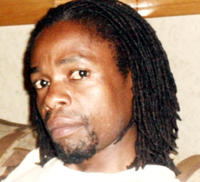For 37-year-old Zimbabwean freelance journalist Sydney Saize, left, enduring arrest and assault has become absurdly routine–and the circumstances routinely absurd. Take his most recent detention, in February. Saize was reporting on a mundane criminal case in Mutare, capital of the diamond-rich Manicaland province, when the story suddenly turned dramatic.
“I was at the court covering a story of five suspects accused of armed robbery when the suspects attempted to escape,” he told CPJ. “I started taking pictures of the attempted escape and managed to get a shot of one of the suspects being gunned down as he tried to escape.” Saize was doing his job–except that in Zimbabwe, draconian media laws and police repression can make that nearly impossible. “I was immediately surrounded by officers from the prison service who seized my camera equipment and my audio recorder, handcuffed me and took me to Mutare police station for questioning,” he said.
Saize was interrogated for seven hours before he was charged under the Criminal Nuisance Act, forced to sign an admission of guilt, fined US$20, and released, according to the Media Institute of Southern Africa. What was he interrogated about? “Basically everything under the sun–my family background, where I lived, who I worked for, etcetera, etcetera. And this went on and on and on,” recalled Saize.
Compared to other encounters with law enforcement and ruling party officials, Saize believed he got off relatively lightly this time. “They released my camera equipment and audio recorder, but only after I deleted all the photographs I had taken. It is really absurd.” It’s hardly the first time, though, that Zimbabwean authorities have turned criminal justice coverage upside down. In March 2010, freelance photojournalist Andrison Shadreck Manyere was arrested for taking footage of prisoners outside a courthouse in Harare. The prison guards accused Manyere of taking footage “without the permission of the Commissioner of Zimbabwe’s prison service.”
Saize himself has been arrested or attacked nearly every year since 2006, according to CPJ research. He had his first brush with authorities in January 2006, when he was arrested for “reporting without accreditation” under Zimbabwe’s media licensing law, and for “reporting falsehoods.” Saize spent three nights in police cells before a judge dismissed the charges for lack of evidence. Then, in 2008, he was beaten by people accusing him of being a “sell-out” for writing stories critical of the ruling ZANU-PF government. In 2009, while covering the burial of a ZANU-PF legislator, he was attacked by assailants who seized his recording equipment. To add insult to injury, police at Mutare Central detained him for nearly an hour, questioning him about his activities and whom he worked for, before releasing him without charge. Finally, in November 2010, while reporting on a local ZANU-PF-PF fund-raising event, he was assaulted by several men who accused him of “writing negative stories” about their party.
“Trying to do your work as an accredited journalist in Zimbabwe is a real challenge because you never really know what to expect from the authorities,” Saize says. “But what can you do? You have to work.” Arrests and assaults, of course, are designed to intimidate the entire press corps. Saize says he is undeterred and has a duty “to be there for the public dying for alternative news coverage rather than the daily propaganda from state papers, TV and radio stations.”
